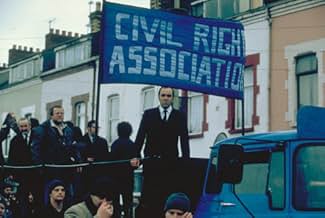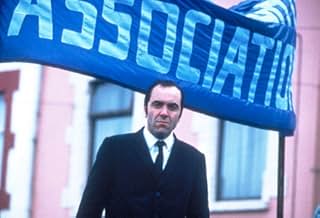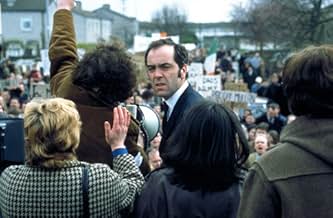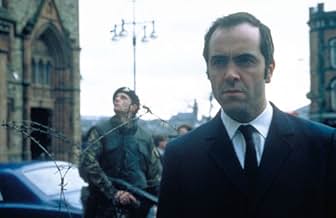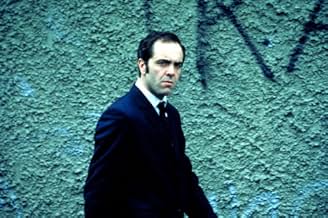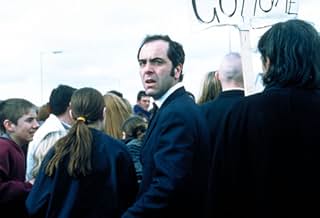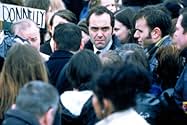IMDb रेटिंग
7.6/10
26 हज़ार
आपकी रेटिंग
अपनी भाषा में प्लॉट जोड़ेंA dramatization of the Irish civil rights protest march and subsequent massacre by British troops on January 30, 1972.A dramatization of the Irish civil rights protest march and subsequent massacre by British troops on January 30, 1972.A dramatization of the Irish civil rights protest march and subsequent massacre by British troops on January 30, 1972.
- 1 BAFTA अवार्ड जीते गए
- 19 जीत और कुल 23 नामांकन
Carmel McCallion
- Bridget Bond
- (as Carmel Mccallion)
Christopher Villiers
- Maj. Steele
- (as Chris Villiers)
फ़ीचर्ड समीक्षाएं
Powerful, provocative & prompting, Bloody Sunday is a meticulously researched, expertly crafted & thoroughly gripping recreation of the Bogside massacre that occurred in the Northern Ireland town of Derry when British troops opened fire on civilians during a protest march, killing 14 & wounding just as many in the process.
Dramatising the events that led to the tragic incident on January 30, 1972, Bloody Sunday follows a civil right activist named Ivan Cooper who was the central organiser of the peaceful rally against internment that ended when British army paratroopers began firing on the unarmed demonstrators in full view of the public & the press.
Written & directed by Paul Greengrass, the movie sets its foreboding tone right within the opening segment after which it takes a step back to put its pieces on the board but once the stage is set, it explodes & moves forward with stunning immediacy. Greengrass' direction is at its very best when things go south & the whole episode is extensively detailed in the script.
Cinematography employs the quasi-documentary-style to film the entire event as it unfolds, thus bringing the viewers right into the conflict, while the frenetic hand-held camera-work further reflects the chaotic nature of such circumstances. Editing is slick for the most part, music is nearly absent and its cast contributes with convincing performances, playing their given roles with utmost sincerity.
On an overall scale, Bloody Sunday is a fiercely directed, deftly scripted, viciously photographed, skilfully edited & brilliantly performed movie that brings the dreadful event to life with remarkable precision, brims with intense emotions from start to finish, and not only works as a riveting thriller but also as an unsettling documentary. Disturbing & disquieting but essential viewing nonetheless, Bloody Sunday is strongly recommended.
Dramatising the events that led to the tragic incident on January 30, 1972, Bloody Sunday follows a civil right activist named Ivan Cooper who was the central organiser of the peaceful rally against internment that ended when British army paratroopers began firing on the unarmed demonstrators in full view of the public & the press.
Written & directed by Paul Greengrass, the movie sets its foreboding tone right within the opening segment after which it takes a step back to put its pieces on the board but once the stage is set, it explodes & moves forward with stunning immediacy. Greengrass' direction is at its very best when things go south & the whole episode is extensively detailed in the script.
Cinematography employs the quasi-documentary-style to film the entire event as it unfolds, thus bringing the viewers right into the conflict, while the frenetic hand-held camera-work further reflects the chaotic nature of such circumstances. Editing is slick for the most part, music is nearly absent and its cast contributes with convincing performances, playing their given roles with utmost sincerity.
On an overall scale, Bloody Sunday is a fiercely directed, deftly scripted, viciously photographed, skilfully edited & brilliantly performed movie that brings the dreadful event to life with remarkable precision, brims with intense emotions from start to finish, and not only works as a riveting thriller but also as an unsettling documentary. Disturbing & disquieting but essential viewing nonetheless, Bloody Sunday is strongly recommended.
I thought this was an amazing movie.
Now I learned about this in school for a while and as an Englishman I do feel a certain, oblique connection to the troubles. I didn't realise this kind of thing could happen among my compatriots (I'm not trying to belittle Irish Nationalism by calling the Northern Irish my compatriots, it's just how I have come to see them), and I hadn't realised I'd thought this way. It was a real consciousness raiser for me.
My biases notwithstanding, this movie is as a hypnotic account of a confusing episode of an even more confusing time. It has the task of representing the mindset of the times, the mindsets, I should say, while still making it into a spontaneous narrative.
I'm not an expert so I cannot vouch for the authenticity of any of this, but I feel I can believe all of it. There is a tendency for us to demarcate history from real life. A million deaths is a statistic as Stalin said. But here I really feel history and the lives of regular people converge in a devastating way.
At its heart I suppose the movie is a mystery. Not so much who-done-it but a why-did-it. I really felt while I was watching, all the chaos and threat that leads to tragedy while still feeling baffled and disorientated throughout. It feels like a documentary. The dialogue is spontaneous but still rich with nuance. The cinematography is candid and even shaky, giving it an often hypnotic, Blair Witch quality.
A movie to never forget.
Now I learned about this in school for a while and as an Englishman I do feel a certain, oblique connection to the troubles. I didn't realise this kind of thing could happen among my compatriots (I'm not trying to belittle Irish Nationalism by calling the Northern Irish my compatriots, it's just how I have come to see them), and I hadn't realised I'd thought this way. It was a real consciousness raiser for me.
My biases notwithstanding, this movie is as a hypnotic account of a confusing episode of an even more confusing time. It has the task of representing the mindset of the times, the mindsets, I should say, while still making it into a spontaneous narrative.
I'm not an expert so I cannot vouch for the authenticity of any of this, but I feel I can believe all of it. There is a tendency for us to demarcate history from real life. A million deaths is a statistic as Stalin said. But here I really feel history and the lives of regular people converge in a devastating way.
At its heart I suppose the movie is a mystery. Not so much who-done-it but a why-did-it. I really felt while I was watching, all the chaos and threat that leads to tragedy while still feeling baffled and disorientated throughout. It feels like a documentary. The dialogue is spontaneous but still rich with nuance. The cinematography is candid and even shaky, giving it an often hypnotic, Blair Witch quality.
A movie to never forget.
being from belfast, i have an all too familiar recollection of this and many other tragic events.
being born protestant, i have little use for the cowardly, yet brutal and malicious, mutation of the provisional ira; under the helm of gerry addams.
being born sentient, i have little use for the fire and brimstone polarisations; counterspin and half-truths of ian paisley.
being born human, i have empathy for the slain.
the bloody Sunday massacre in derry, was a tragic testament to man's blood-lust, fueled by fear and adrenaline. the events depicted in the movie "bloody Sunday," provide an arresting portrayal of a tacitly monumental aspect of modern ulster history. the portrayals of the people and the events maintain an objective testimony toward a tragedy that is both sobering and inexcusable.
"bloody Sunday" takes no sides, and distributes no blame. it simply reenacts the events as they were recorded, and lets the viewer make his or her own decisions.
if you are familiar with the conflict; if you are distressed by man's inhumanity unto himself; if you are simply interested in a detached account of history; this is an important film to see.
being born protestant, i have little use for the cowardly, yet brutal and malicious, mutation of the provisional ira; under the helm of gerry addams.
being born sentient, i have little use for the fire and brimstone polarisations; counterspin and half-truths of ian paisley.
being born human, i have empathy for the slain.
the bloody Sunday massacre in derry, was a tragic testament to man's blood-lust, fueled by fear and adrenaline. the events depicted in the movie "bloody Sunday," provide an arresting portrayal of a tacitly monumental aspect of modern ulster history. the portrayals of the people and the events maintain an objective testimony toward a tragedy that is both sobering and inexcusable.
"bloody Sunday" takes no sides, and distributes no blame. it simply reenacts the events as they were recorded, and lets the viewer make his or her own decisions.
if you are familiar with the conflict; if you are distressed by man's inhumanity unto himself; if you are simply interested in a detached account of history; this is an important film to see.
I have seen "Bloody Sunday" twice now - once on the big screen and once on DVD - and read Don Mullen's book, "Eyewitness Bloody Sunday." This movie is a very realistic depiction of the defining moment of the "troubles" in Northern Ireland. The hand-held cameras and grainy film style make it feel more like a documentary than a movie, which of course is the intent. As another reviewer has mentioned, the acting is very natural throughout. It does take some time to get started, but once the the shooting starts it hits the viewer like a sledgehammer. Very powerful.
The film jumps so frequently from scene to scene that at times it is distracting, though I was much less annoyed by this the second time around. And, having seen it once with and once without subtitles, I must say that although the subtitles (optional on the DVD) are intrusive they are quite welcome. I love the Irish accent but at times it can be difficult for me to decipher,and much of the dialogue in the movie is muted. It was good to know what was being said.
As for the objectivity, of course the movie is slanted - so was the situation. But it is not unreasonably slanted. The British are not shown as one-dimensional demons - in particular, Nicholas Farrell does a great job of conveying Brigadier Mclellan's ambiguity and even disapproval of the course taken against his wishes by the supposed "Observer," Maj. Gen. Ford (who, if the movie has a villain, is the prime candidate.) At one point early on several Paras are discussing the day's prospects, and reveal how tired they are of being harassed, shot at and otherwise abused by the native population. This makes the day's events more understandable. This does not EXCUSE the cold-blooded gunning down of 27 people - there is no excuse for that - but at least one can see a contributing factor. And protesters are shown, once or twice, firing back. (The key here is firing BACK - evidence indicates that no marchers fired until the first two protesters were wounded. And those scattered few that attempted return fire were quickly dissuaded by their countrymen. Later in the day the IRA did go into action, but not until after the bloodletting in Bogside was over with.) Ivan Cooper's (James Nesbitt) words at the close of the film were shown to be all too true in the years since the actual incident. The IRA was on unsteady legs at the time, but has never lacked support since January 30, 1972.
The film is a powerful object lesson concerning the misuse of force, and one that governments everywhere - including my own country, the United States - should take to heart. It has a few flaws, but I think deserves the awards it has received. 8/10 points.
The film jumps so frequently from scene to scene that at times it is distracting, though I was much less annoyed by this the second time around. And, having seen it once with and once without subtitles, I must say that although the subtitles (optional on the DVD) are intrusive they are quite welcome. I love the Irish accent but at times it can be difficult for me to decipher,and much of the dialogue in the movie is muted. It was good to know what was being said.
As for the objectivity, of course the movie is slanted - so was the situation. But it is not unreasonably slanted. The British are not shown as one-dimensional demons - in particular, Nicholas Farrell does a great job of conveying Brigadier Mclellan's ambiguity and even disapproval of the course taken against his wishes by the supposed "Observer," Maj. Gen. Ford (who, if the movie has a villain, is the prime candidate.) At one point early on several Paras are discussing the day's prospects, and reveal how tired they are of being harassed, shot at and otherwise abused by the native population. This makes the day's events more understandable. This does not EXCUSE the cold-blooded gunning down of 27 people - there is no excuse for that - but at least one can see a contributing factor. And protesters are shown, once or twice, firing back. (The key here is firing BACK - evidence indicates that no marchers fired until the first two protesters were wounded. And those scattered few that attempted return fire were quickly dissuaded by their countrymen. Later in the day the IRA did go into action, but not until after the bloodletting in Bogside was over with.) Ivan Cooper's (James Nesbitt) words at the close of the film were shown to be all too true in the years since the actual incident. The IRA was on unsteady legs at the time, but has never lacked support since January 30, 1972.
The film is a powerful object lesson concerning the misuse of force, and one that governments everywhere - including my own country, the United States - should take to heart. It has a few flaws, but I think deserves the awards it has received. 8/10 points.
Normally I don't enjoy the handheld documentary style films, as they tend to induce waves of nausea, but Bloody Sunday had me riveted from the word go. That we already know how it's going to end is irrelevant, the pressure building on the day of the march is almost unbearable. Though there's been criticism that the film is slanted towards the republican point of view, I found it balanced, even in the depiction of the soldiers and officers. Everybody certainly looked the part and I went away feeling some sympathy for both sides. Given the close quarters and inflammatory nature of the conflict, it's amazing that bloodbaths like this (soldiers blasting civilians) haven't happened more often in Northern Ireland. It's only now, that retired soldiers have broken ranks and talked about what actually happened, that a film like this can see the light of day.
क्या आपको पता है
- ट्रिवियाTo make this movie as authentic as possible, no lights were used in the movie and the camera work was entirely hand-held
- गूफ़The marchers carry homemade cardboard signs with slogans written on them. When shown from behind, some have modern printing ("Made in China") on them that are not appropriate for 1972.
- भाव
Ivan Cooper: I just want to say this to the British Government... You know what you've just done, don't you? You've destroyed the civil rights movement, and you've given the IRA the biggest victory it will ever have. All over this city tonight, young men... boys will be joining the IRA, and you will reap a whirlwind.
- क्रेज़ी क्रेडिटThe live rendition of U2's Sunday, Bloody Sunday continues to play for a full three minutes over a black screen after the credits finish rolling.
- कनेक्शनFeatured in The 2003 IFP Independent Spirit Awards (2003)
टॉप पसंद
रेटिंग देने के लिए साइन-इन करें और वैयक्तिकृत सुझावों के लिए वॉचलिस्ट करें
विवरण
- रिलीज़ की तारीख़
- कंट्री ऑफ़ ओरिजिन
- भाषा
- इस रूप में भी जाना जाता है
- Domingo sangriento
- फ़िल्माने की जगहें
- उत्पादन कंपनियां
- IMDbPro पर और कंपनी क्रेडिट देखें
बॉक्स ऑफ़िस
- बजट
- £20,00,000(अनुमानित)
- US और कनाडा में सकल
- $7,73,228
- US और कनाडा में पहले सप्ताह में कुल कमाई
- $29,419
- 6 अक्टू॰ 2002
- दुनिया भर में सकल
- $17,58,689
- चलने की अवधि1 घंटा 51 मिनट
- रंग
- ध्वनि मिश्रण
- पक्ष अनुपात
- 1.85 : 1
इस पेज में योगदान दें
किसी बदलाव का सुझाव दें या अनुपलब्ध कॉन्टेंट जोड़ें


